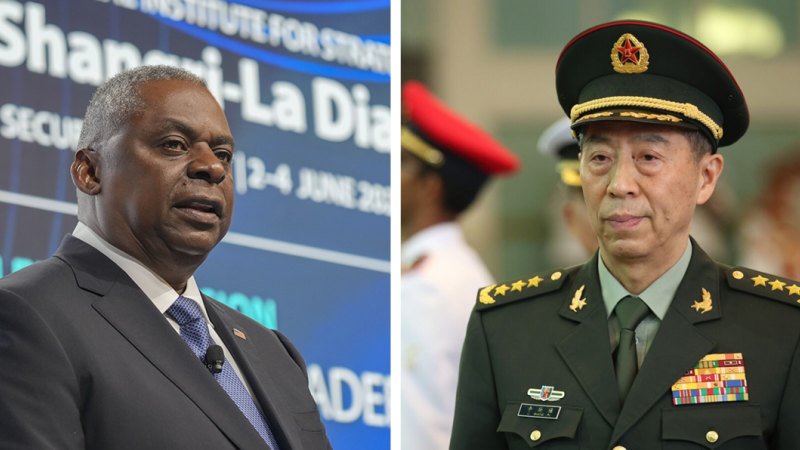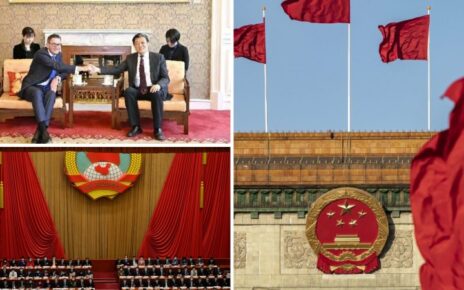Save articles for later
Add articles to your saved list and come back to them any time.
Singapore: US Defence Secretary Lloyd Austin has issued a rare public rebuke of his Chinese counterpart, General Li Shangfu, accusing Beijing’s defence minister of shirking his global responsibility by failing to meet Austin at the Shangri-La Dialogue in Singapore.
“For responsible defence leaders, the right time to talk is anytime. The right time to talk is every time and the right time to talk is now,” he said.
US Defence Secretary Lloyd Austin and Chinese General Li Shangfu.Credit: AP
Austin and Li were photographed shaking hands at the Shangri-La’s opening dinner on Friday night and were seated at the same table as Australian Prime Minister Anthony Albanese.
“A cordial handshake over dinner is no substitute for a substantive engagement,” Austin said.
“If we talk we can avoid the misunderstandings and miscalculations that could lead to crisis or conflict. I am deeply concerned at the PRC has been unwilling to engage more seriously on better mechanisms for crisis management between our two militaries. I hope that will change soon.”
The public fallout has revealed growing frustration in Washington over Beijing’s reluctance to engage with what President Joe Biden and Albanese have labelled “guardrails” to avoid disagreement from spiralling into conflict.
US Defence Secretary Lloyd Austin, right, shakes hands with China’s National Defence Minister Li Shangfu on Friday night. Credit: AP
China has accused the US and its allies of attempting to contain its ambitions. Li has refused to meet Austin since he was appointed in March.
Li was sanctioned by the US in 2018 over the purchase of Russian fighter jets.
But the relationship has now become so strained that it is affecting negotiations over the Taiwan Strait, nuclear proliferation and freedom of navigation exercises in the South China Sea.
Asked if the two sides had engaged in arms control negotiations after US State Department figures revealed last year China would reach nuclear parity with the United States in the next 15 years, Austin said he did not have any updates.
“You got to talk to them first,” he said. “So as soon as they actually pick up the phone, maybe we’ll get some work done there.”
International Institute for Strategic Studies Asia director James Crabtree said it was “not really in China’s interest to have these guardrails”.
“You know, if the Americans say, well, we can compete across all of these areas, but we’re not going to do these things that would in a sense, remove China’s room for manoeuvre.”
Austin also accused China of conducting an alarming number of risky intercepts of US and allied aircraft flying lawfully in international airspace. A Chinese fighter jet swerved in front of a US reconnaissance aircraft over the South China Sea on May 26.
“We’ve all just seen another troubling case of aggressive and unprofessional flying by the People’s Republic of China,” he said. “So we will support our allies and partners as they defend themselves against coercion and bullying.”
But Austin also sought to downplay other predictions from US military leaders of a Chinese invasion of neighbouring Taiwan before the end of this decade.
“I believe what they are pointing to in some cases is the fact that President Xi [Jinping] challenged his military to develop the capabilities to conduct military operations by 2027. It doesn’t mean that he’s made a decision to do that,” he said.
“But my opinion is that conflict is neither imminent nor is it inevitable, and so, we’re going to do everything we can to make sure that we’re doing the right things to maintain the status quo.”
Nevertheless, he said it was important for the US, Japan and Australia to strengthen their joint operational war plans in the event of a conflict.
“It’s important to have where possible, compatible platforms. It’s really important to make sure that you have policies and procedures that you and your allies or partners understand and are familiar with,” he said.
“We have come a long way. But we are by no means where any of us want to be eventually.”
Asked by a Chinese military representative whether the US pursuit of the AUKUS nuclear submarine deal with Australia and the United Kingdom and the Quad with Australia, India and Japan would sideline the Association of South-East Asian Nations (ASEAN) and other regional forums, Austin said they would “promote greater stability and security”.
China’s Foreign Ministry has accused the US and Australia of embarking on a path of “error and danger” through the security deals.
“We’re not trying to create a NATO in the Indo-Pacific,” Austin said. “We value our relationships with our allies and partners.”
CIA Director William Burns made a secret visit last month to Beijing, where he met Chinese intelligence officials, in an effort by the Biden administration to stabilise relations with China, the Financial Times reported.
US Secretary of Defence Lloyd Austin speaks at the Shangri-La Dialogue in Singapore.Credit: AP
A person familiar with the visit told Bloomberg that dialogue between the countries’ intelligence services continues as a wider diplomatic frostiness persists.
Get a note directly from our foreign correspondents on what’s making headlines around the world. Sign up for the weekly What in the World newsletter here.
Most Viewed in World
From our partners
Source: Read Full Article





